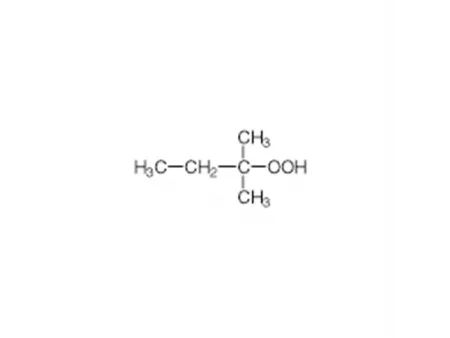tert-Amyl hydroperoxide (TAHP)
- Chemical Family Organic Peroxide
- Molecular Formula C₅H₁₂O₂
- Molecular Weight 104
- UN No. 3107
- Road Transport (ADR) 5.2
- Rail Transport (RID) 5.2
- Sea Transport (IMDG) 5.2
Half-Life Period
(measured in chlorobenzene solution)
- 0.1 hour 202℃
- 1 hour 183℃
- 10 hours 165℃
- Theoretical active oxygen content: 13%
- Self-accelerating decomposition temperature (SADT): 75℃
- Hazardous temperature (Tem): 70℃
- Storage temperature (Ts min/Ts max): 0/35℃
- Solubility: Very soluble in most organic solvents
- Major decomposition products: methane, acetone, tert-amyl alcohol
TAHP is a widely used initiator for free radical reactions, valued for its stability and ease of handling. Unlike other initiators, it doesn't require freezing and can be stored safely at temperatures below 50°C for up to three months without losing effectiveness. This makes it especially convenient for industrial use. TAHP is often preferred in applications like emulsion polymerization, aqueous-phase polymerization, curing, and graft polymerization due to its performance advantages over alternatives like persulfates, cumene hydroperoxide, and benzoyl peroxide. One notable benefit of TAHP is that its decomposition results in tert-amyl alcohol and small amounts of acetone, which are non-corrosive and cause less wear on equipment, unlike other initiators that often produce acidic by-products.
TAHP is used as a polymerization initiator in the production of styrene and its copolymers, such as SAN and ABS. It is also widely used in the polymerization of acrylic and methacrylic compounds, as well as vinyl chloride. Beyond its industrial uses, TAHP is an intermediate in organic synthesis, frequently applied in pharmaceutical manufacturing.
-
Packaging
The standard packaging for TAHP is available in polyethylene drums with net weights of 20 kg or 180 kg. Custom packaging options can also be arranged based on specific customer requirements.
-
Storage
TAHP should be stored in tightly sealed containers in a well-ventilated area, with a maximum storage temperature of 35°C. It is crucial to avoid contact with reducing agents such as amines, acids, bases, and heavy metal compounds (including accelerators and metallic soaps). Repackaging or handling inside storage areas is strictly prohibited.
-
Safe Handling
Keep the product away from fire, open flames, and heat sources.
Avoid contact with reducing agents (e.g., amines), acids, bases, and heavy metal compounds (e.g., accelerators, metallic soaps).
Always refer to the product’s Safety Data Sheet (MSDS) for detailed safety guidelines.
